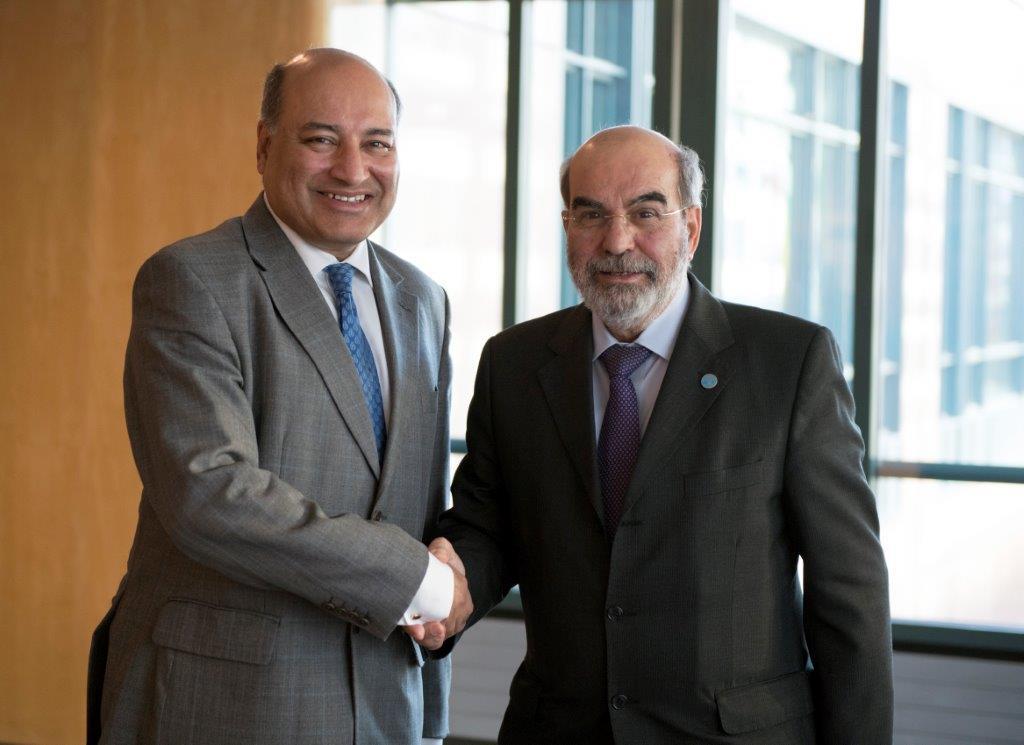FAO and EBRD mark 20th anniversary with renewed commitment to sustainable food value chains
Making "farm to table" chains greener and more participatory in Central and Eastern Europe, Central Asia and the Southern and Eastern Mediterranean.

EBRD President Sir Suma Chakrabarti and FAO Director-General José Graziano da Silva.
©Photo: ©EBRD/Dermot Doorly
28 November 2017, London/Rome - The European Bank for Reconstruction and Development (EBRD) and the Food and Agriculture Organization of the United Nations (FAO) have agreed to step up their joint efforts to make agrifood systems stronger, greener and more inclusive across Central and Eastern Europe, Central Asia and the Southern and Eastern Mediterranean.
The two institutions also stressed the importance of climate change mitigation and adaptation initiatives for agriculture as they marked 20 years of collaboration with a Memorandum of Understanding, signed today in London by EBRD President Sir Suma Chakrabarti and FAO Director-General José Graziano da Silva.
"We see our partnership with FAO as crucial for fostering the transition of the agribusiness sector in our region," President Chakrabarti said. "By drawing on FAO's technical and policy expertise, we are able to make more effective investments across agrifood chains, helping to enhance productivity, improve energy efficiency, create jobs and promote sustainable and inclusive growth," he added.
FAO Director-General Graziano da Silva said: "The regions where we work together - Central and Eastern Europe, Central Asia and the Southern and Eastern Mediterranean - play critical though contrasting roles in global food and agricultural markets. I am confident that together we will continue to build on our respective strengths and support the emergence of an enabling environment for all private players - from small scale farmers to leading agribusinesses."
Public private dialogue in action
Since the start of their cooperation the EBRD and FAO have teamed up in more than 150 projects with a total value of US$ 36 million over the past two decades. For example, after Ukraine imposed grain export restrictions and quotas nearly ten years ago - negatively affecting investment in the sector and the country's agriculture in general - the EBRD and FAO initiated a new era of public-private dialogue on government policies and sector issues.
Since then, working groups in the grain, dairy, meat, horticultural and other sectors have facilitated changes in food standards, removed investment-obstructing regulations and supported diversification into new markets.
This has helped Ukraine to become a leading global food exporter and active member of the G20's Agricultural Market Information System (AMIS) - an inter-agency platform to enhance food market transparency and policy response for food security.
"Greening" the agribusiness sector
Looking ahead, making agrifood systems more sustainable will be a top priority for future joint efforts of FAO and EBRD. This will include helping countries curb food losses, use resources more efficiently and reduce the sector's carbon footprint.
The two institutions have already developed an approach that enables countries and investors to prioritise the adoption of climate technologies in the agricultural sector - from solar-powered water pumps to energy-efficient cold storage. The approach has been applied in Morocco and is currently under consideration in Kazakhstan and the Kyrgyz Republic.
FAO and the EBRD are also exploring the potential of converting unused agricultural residues into bioenergy for heating, cooking and electricity in countries such as Egypt and Turkey.
Greater value chain inclusion
Equally important to ensure sustainability from "farm to table" is the inclusion of producers and small and medium-sized enterprises in modern food value chains. To achieve this, FAO and the EBRD are assisting such businesses in adjusting to higher food quality and safety standards. Successfully targeting more advanced markets means creating added value, but is rewarded with higher returns.
In Georgia, Serbia and Montenegro the two institutions have supported the development of the so-called "Geographical Indications" - an origin-based official labelling system that protects the reputation of traditional agrifood products, helping them to stand out in the fierce competition for market shares thanks to recognised high quality standards.
In Tunisia and Morocco, FAO and EBRD are supporting stronger and more efficient olive oil sectors to increase market opportunities and create jobs, especially for young people.
Achieving the UN Sustainable Development Goals by 2030 - from ending extreme poverty and hunger to combating climate change and reducing inequalities - will require greater public-private sector cooperation, strategic alliances and innovation. The EBRD and FAO are well on track to making a strong contribution to these goals.
Contact
Peter Mayer FAO News and Media (Rome) (+39) 06 570 53304 [email protected]
